Cybersecurity courses cover topics including cyber-attacks, information security, and data privacy. In a world where more and more everyday tasks are being completed online, this information is of great importance to most people. Especially given that more online activity generally means more generated data and more opportunities for cyber-attack vulnerabilities. Learning about such systems and how to counter new forms of cyberattacks is a valuable skill and is going to become even more vital in the near future. Organizations that want to keep assets and sensitive information safe also need to invest in cybersecurity programs and training. For such companies, cybersecurity courses are a great way to get started.

In this guide, readers will learn about the best online cybersecurity courses in 2023 as well as the benefits that the information in these courses can bring about. This article begins by individually covering the advantages and disadvantages of 9 of the best cybersecurity courses available. The benefits of cybersecurity information are then covered in more depth, followed by some real-world advice to help users find the best course to match their cybersecurity needs. Finally, the article explains the advantages and disadvantages of using a free cybersecurity course. This is particularly important because, depending on the course and the method of teaching, an online cybersecurity course can be completely free or cost over $1000.
The best online cybersecurity courses in 2023 are given below:
- Advanced Cyber Security Training by EC Council – FutureLearn
- The Complete CS Course: End Point Protection! – Udemy
- Cyber Security Foundations: Start Building your Career in Cyber Defense by EC-Council – FutureLearn
- Post Graduate Program in Cyber Security – MIT Schwarzman College of ComputingEC-Council – FutureLearn
- Cybersecurity for Managers – MIT Management Executive Education
- The Complete Cyber Security Course for Beginners: Hackers Exposed – Udemy
- Cybersecurity Certification by University of Maryland – Coursera
- Cyber Security Training Course – Pluralsight
- Cyber Security Course from NYU – Coursera
Table of Contents
1. Advanced Cyber Security Training by EC Council – FutureLearn
The Advanced Cyber Security Training online course offered by FutureLearn is for people looking to practice new cyber security skills while learning more about the latest security threats and the best ways to manage such threats. There isn’t a specified experience level required for the Advanced Cyber Security Training course and the course is offered as part of ExpertTrack. Both experienced and novice learners will find the course useful. With that said, some understanding of how cybersecurity and networks work in the real world will enable users to progress through the course much faster.
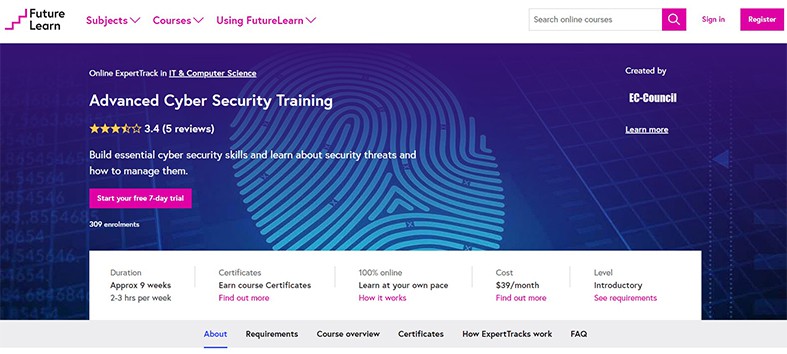
The Advanced Cyber Security Training course is developed by the International Council of E-Commerce (or EC Council). The EC Council is currently the biggest and most recognized cyber security technical certification entity. Through the Advanced Cyber Security Training course, the EC Council offers practical experience handling cybersecurity issues for purchasers of the course. The EC Council also takes a deep dive into topics such as password attacks and security.

The official duration of the course by the EC Council is around 9 weeks, assuming the user works for 2 to 3 hours per week. The lessons are structured in a way that the purchaser can set the pace and then follow that throughout the course. Lessons start with an introduction to types of password attacks and password security and end with web application fundamentals to teach students how to handle software security.
Some of the skills purchasers of the course will learn include cyber security fundamentals, network security, password security, penetration tests, password protection, how to enhance software security, and concepts surrounding protecting applications. It is possible to find work in the IT industry with the skills learned on this course.
The Advanced Cyber Security Training by EC Council is considered one of the best online cybersecurity courses in 2023 because the course is relevant, doesn’t require prior experience or education to get started, is cost-effective (subscribers only pay $39 per month), and has consistently good reviews (on the FutureLearn platform in particular).
2. The Complete CS Course: End Point Protection! – Udemy
The Complete CS Course: End Point Protection! is a cybersecurity course for people looking to enhance their knowledge in areas such as online anonymity, privacy, and security. The course, which is offered by Udemy, also deals with the latest trends in endpoint protection methods and cyber security in general.
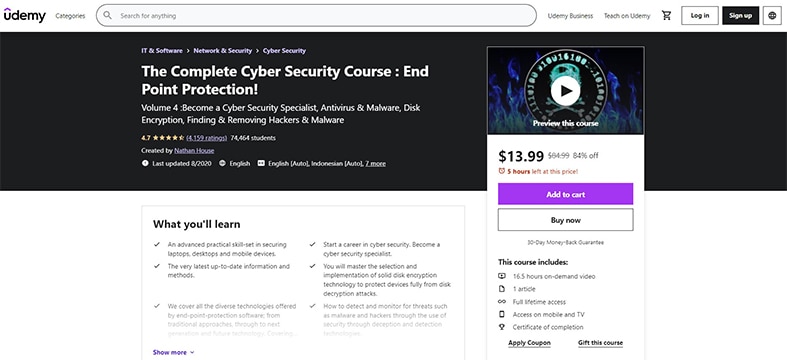
As far as the required level of the course is concerned, the creator of the course specifies that students should have some understanding of how the internet, networks, and operating systems work. The course creator also recommends students go through the previous three courses which form a part of a series of courses with The Complete CS Course: End Point Protection! forming the fourth part.
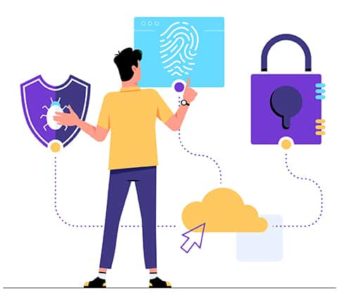
Nathan’s course covers the fundamentals of securing modern computing systems such as mobile devices, desktop computers, and laptops. The course also offers tips on how to start a career in cyber security, the latest trends in device security, technologies used, end-point protection applications, application control, machine learning, AI, malware removal techniques, solid disk encryption, latest threat detection methods, operating system hardening, email and messenger security, the techniques used in anti-forensics, and obtaining potential certificates.
The Complete CS Course: End Point Protection has no specific duration. It is designed to be used consistently over time. All the courses available on the Udemy platform allow lifetime access. As far as lessons go, the first lesson gives an introduction to the course along with information about the target audience and course updates. Subsequent lectures cover the learning objectives and goals of the course. From lesson 2 onwards, the course material gets a bit more technical where the author covers topics such as file and disk encryption, antivirus and endpoint protection, next-generation detection and response, threat detection, and monitoring. The final few lessons talk about messenger privacy and email anonymity, along with secure deletion processes along with application hardening.

Consumers who purchase the Complete CS course can learn practical skills that will help them get on the path to becoming white hat hackers. After taking the course, students will have a solid foundation in cyber security and the trends the industry is following. If the course is combined with the three previous courses (part of the series) then the purchaser can become an expert in online anonymity, privacy, and security at a theoretical level.
The Complete Cyber Security Course: End Point Protection is one of the best online cybersecurity courses because the course targets the latest in-demand skills and organizes the content so that anyone can follow along. The course costs $84.99 but does run discount seasons during which the price can drop to as low as $13. As far as Udemy ratings go, this course has 4.7 stars out of 5 after 4110 ratings and more than 74000 students have enrolled on the course so far. Cybersecurity is a growing field and this course tries to teach the most in-demand topics in the field.
3. Cyber Security Foundations: Start Building your Career in Cyber Defense by EC-Council – FutureLearn
Cyber Security Foundations: Start Building your Career in Cyber Defense is an online cybersecurity course, offered by EC-Council, aimed at helping online users understand the importance of cyber security. This course also explains how organizations can go about building cyber resilience in the face of increasing cyberattacks.

The CyberSecurity Foundations course’s target audience includes IT professionals looking to enhance their understanding of cyber security and deepen existing knowledge in related fields. This cybersecurity course is aimed at people in managerial positions in departments such as data security. People who regularly oversee the working of IT teams are also suited for this course.
Purchasers of the course will learn about a wide variety of topics such as IT management, IT security, developing cyber resilience programs, virus protection, malware protection, ransomware protection, cyber security, data security, and data protection. The duration of the course is around 15 weeks assuming the student gives the course 2 hours per week.

EC Council has divided the Cyber Security Foundations course into four sub-courses. The first few lessons deal with the first steps in protecting user data and how users should go about addressing suspicious online activity. The second sub-course goes into a few more details and expands upon topics such as social engineering techniques and phishing-related cybersecurity attacks. Similarly, the next sub-source details additional cybersecurity topics such as access and identity management along with security authorization and the role of the organization in developing processes for identity and access management. Finally, EC-Council finishes the course with some case studies.
FutureLearn is the platform that offers the Cyber Security Foundations course. Subscribers (to Future Learn) can expect to learn the foundational cyber security concepts and the relevant industry issues facing experts in the field today. Along with that, subscribers will also learn how to assess various kinds of cyber-attacks and evaluate systems to reduce vulnerabilities and minimize risk.
After finishing the course, subscribers will be one step closer to becoming IT professionals and will be in a reasonable position to apply for jobs in the cybersecurity field.
The Cyber Security Foundations course is considered one of the best online cybersecurity courses because the content is good quality (EC-Council is a reputable certification body and hence covers topics that are relevant and trending), self-paced and certificate-eligible. This course is also reasonably priced: users only need to pay the standard $39 per month to have access to the course for as long as is desired.
4. Post Graduate Program in Cyber Security – MIT Schwarzman College of Computing
The Post Graduate Program in Cyber Security is an online cybersecurity course that takes a more formal approach to teaching cybersecurity-related concepts and trends when compared to some of the other courses on this list.
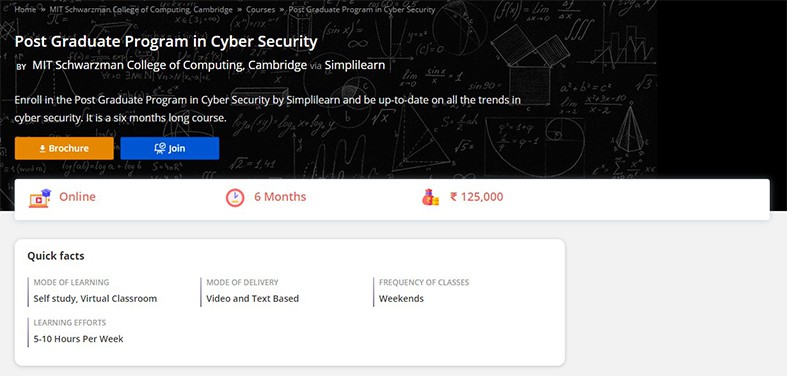
As the name of the course suggests, this cyber security course is part of a post-graduate program and hence the program is geared towards working IT professionals and executives. Unlike some of the other cybersecurity courses mentioned here, the Post Graduate Program in Cyber security does have an eligibility criterion: a minimum of 50% achievement in a Bachelor’s degree. Moreover, candidates who have prior programming knowledge will find the course easier to understand and implement explained concepts.

For purchasers, the course provides access to multiple master classes, certificates, job assist programs, hands-on training, capstone projects, industry knowledge from expert faculty members, and access to Ceh v11 ilabs for six months. The expected duration of the Post Graduate Program in Cyber Security by MIT is six months.
This cybersecurity course aims to cover a syllabus rather than just offer lessons. The syllabus has an introduction part after which the course goes into topics such as secure applications, networks, and designs by developing systems. Slowly, the course moves towards application, technology, and policy of cyber security by MIT SCC. Finally, the course ends with masterclasses on Cyber Security offered by the MIT faculty in addition to Capstone projects.
Simplilearn is the platform that offers this cybersecurity course. Students can expect to learn about cybersecurity-related topics such as testing and assessing security, honeypots, IDS firewalls, mobile and web technologies, network packet analysis, advanced hacking concepts, network security, risk management, cryptography OSI and TCP IP models, identity management, access management, and the development of security software.
After taking the course, students will become more accomplished in fields requiring advanced knowledge such as risk analysis, cloud-based security, compliance, mitigation, and protection of data.

The Post Graduate Program in Cyber Security offered by MIT Schwarzman College of Computing is considered one of the top online cybersecurity courses because the course is taught by an accomplished faculty and touches upon the most up-to-date trends in cyber security. The course is available online and takes advantage of modern teaching concepts such as self-study and virtual classrooms. Finishing the course provides the student with the opportunity to apply for a certificate. Students become a part of MIT SSC Professional Learning Community and get access to JobAssist which is a bonus. The cost of the course is around $1700, making it one of the most expensive courses on this list. This is in part due to the reputation of MIT. There are more expensive courses on the market, however, which do not offer this much content or the same quality of expert teaching.
5. Cybersecurity for Managers – MIT Management Executive Education
The Cybersecurity for Managers – MIT Management Executive Education course is an online cybersecurity course offering cybersecurity education and enabling students to develop cybersecurity plans for different clients such as NGOs and SMBs.
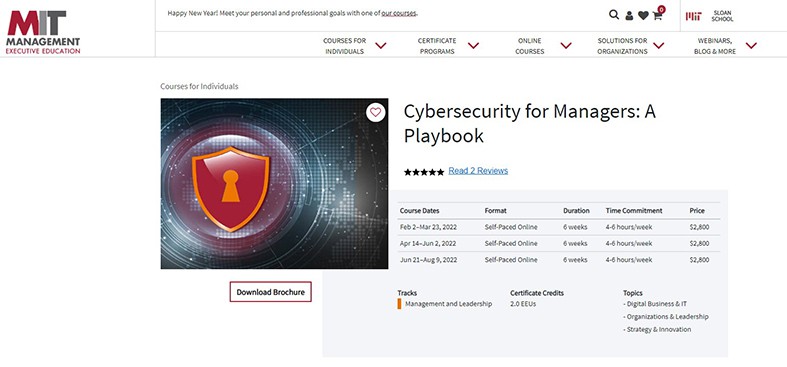
Cybersecurity for Managers is mainly aimed at business leaders along with executives and general managers who have a requirement of building action plans to make organizations more resilient against cyber threats. Apart from that, business and technology consultants can also take the course to bridge the gap between business and technology in a given organization. Hence this course is not aimed at beginners but rather at people with significant experience and knowledge of IT and computing systems in general.

The Cybersecurity for Managers course is offered by MIT and most of the instructors of the course have faculty positions at MIT. More specifically, the lecturers of the course include Stuart E. Madnick (Professor of Information Technology), Keri Pearlson (Executive Director at MIT Sloan), and Michael D. Siegel (Principal Research Scientist at MIT Sloan School of Management).
This course is mainly for people on Management and Leadership tracks and grants Certificate Credits (2.0 EEUs). The information presented in the course comes in the form of videos, assignments, discussion forums, practice quizzes, and presentations. Students get access to Success Advisers for organizing studying time and providing support for various technical and administrative queries.
The duration of the Cybersecurity for Managers course is around 6 weeks. Students are expected to spend anywhere between 4 to 6 hours per week studying the material presented in the course. The format of the course is self-paced and completely online.
Note:
The Cybersecurity for Managers course is slightly different from most typical online cybersecurity courses as there is no set content. The course will cover the techniques necessary to create a cyber-aware culture at a given organization, manage the effects of various cyber-attacks including data breaches, and make all the necessary decisions regarding a given organization’s cybersecurity setup.Additionally, lessons will present techniques for assessing risks, reducing vulnerabilities, and improving defenses in a given organization. The platform offering Cybersecurity for Managers is Emeritus. Prospective students have to apply to the program via the Emeritus website which offers all MIT Management Executive Education.

After taking the course, students will be able to speak and understand the technical terms cybersecurity professionals use to communicate ideas and form opinions. That will also allow students to hold informed conversations with technology teams and colleagues. Completing the course will also grant the student a certificate of course completion by MIT Sloan School of Management.
Cybersecurity for Managers is ranked as one of the best online cybersecurity courses because, first, the course is offered by a competent faculty and organization (MIT and the faculty at MIT Sloan School of Management), And second, the course covers the most in-demand topics in cybersecurity today for managers such as strategy and innovation in digital business and IT. The course additionally covers organizations and leadership in the field of cybersecurity. Cybersecurity for Managers has decent reviews according to the official page at mit.edu and is priced at $2800.
6. The Complete Cyber Security Course for Beginners: Hackers Exposed – Udemy
The Complete Cyber Security Course for Beginners: Hackers Exposed is an online cybersecurity course helping prospective students learn more about stopping hackers, preventing cyber-attacks, and generally getting more competent at understanding infosec and IT security concepts. This course is taught completely in English but offers closed captions in over 8 languages.
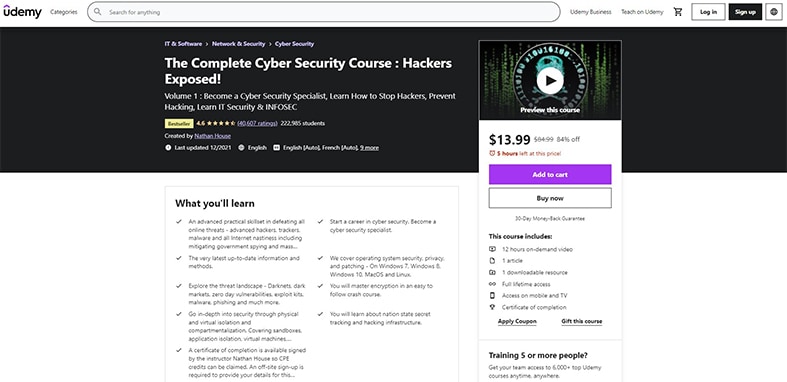
The level of the Complete Cyber Security Course is suitable for beginner to intermediate students. The creator of the course considers anyone looking to become an expert in cybersecurity areas such as anonymity, privacy, and security as the target audience. Apart from that, anyone looking to enhance the skills used in mitigating cyber-attack risks such as malware/trojan infection and various other online threats will also find the course useful.
Information contained in The Complete Cyber Security Course helps students secure previous emails, social media accounts, personal information, and other sensitive files. Both intermediate and beginner internet users can enhance their understanding of how hackers, governments, and corporations work to invade user privacy and make anonymous internet experiences harder. The tips contained in the course not only work for individuals but also businesses.
Due to the structure of the course, there is no duration or time limit. Prospective students only have to pay a one-time fee and gain access to the course indefinitely.

The lesson structure starts things off with an Introduction section and then quickly covers the threat and vulnerability landscape. Then the course goes through a short encryption crash course and teaches students how to set up a test environment using virtual machines. In the later parts of the course, lessons target topics such as operating system security and privacy, security bugs, vulnerabilities, threat privilege (and how to reduce such an issue), how to defend against social engineering and social media cyber threats. Finally, the course finishes with important lessons such as security domains and compartmentalization and isolation techniques to enhance security.
The platform offering the Complete Cyber Security Course is Udemy. Students taking the course will learn about practical skills that help manage various kinds of online threats such as malware, trackers, and hacking. Apart from the latest trends in cybersecurity, the course goes in-depth on topics like virtual isolation, digital and physical compartmentalization, application, isolation, and sandbox usage. Students will also get to know encryption and how to use encryption for enhanced protection.
Upon completion of this course, students will get a certificate of completion, qualify for CPE credits, and will be one step closer to a career in cyber security.
The Complete Cyber Security course is considered one of the best online cybersecurity courses because the course covers relevant and in-demand skills (in cybersecurity). The course is taught by a professional with field experience and has terrific ratings (4.5 stars out of 5 on Udemy after 40k ratings). This cybersecurity course is organized in a way that makes learning easy and costs $84.99 most of the year (during the discount season the price of the course can come down to about $13).
7. Cybersecurity Certification by University of Maryland – Coursera
The Cybersecurity Certification (Cybersecurity Specialization) is an online cybersecurity course available to students who want to learn more about the construction of secure systems and other cybersecurity fundamentals.

This course is marked at an intermediate level meaning that students should have some experience in the field of cybersecurity. The cybersecurity Certification course is offered by the University of Maryland. Instructors of the course include Jennifer Golbeck (Director at the University of Maryland Human-Computer Interaction Lab), Michael Hicks (Professor at the Department of the Computer Science University of Maryland), Gang Qu (Associate Professor of Electrical and Computer Engineering), and Jonathan Katz (Professor and Director at the Maryland Cybersecurity Center).
The Cybersecurity Specialization by the University of Maryland mainly touches on fundamental cybersecurity concepts which form the base of most secure systems. First, the course takes a look at the hardware side of things and then moves towards the software required for effective human-computer interaction. This course teaches cybersecurity concepts not just through examples but also in-field practice, hand-on exercises with trending techniques and tools to thwart cyber threats. More importantly, the course tries to develop a security-oriented mindset amongst the students.
As for the duration of the course, Cybersecurity Specialization should take 8 months to finish provided the student spends around 2 hours per week. However, there is flexibility in the schedule and students can go as fast and/or slow as desired.

University of Maryland Cybersecurity Specialization certification starts with the Usable Security course (the Cybersecurity Specialization consists of 5 different courses). The USable Security course teaches students how to build and ensign secure systems. The second course deals exclusively with software security. The Software Security components of this cybersecurity certification explore software security foundations that all cybersecurity experts need to know. The third course is labeled Cryptography which introduces students to modern cryptography and how cybersecurity experts should go about developing applications taking advantage of cryptography techniques. Towards the end, the course covers Hardware Security. In this course, students learn about trust and security as far as computer hardware is concerned. The course shows different system design flows and how some are vulnerable to physical attacks. Finally, students put everything learned in the course to practice with a project. The fifth course in the Cybersecurity specialization is the Cybersecurity Capstone Project. Students of the course have to build a secure software system. A set of students then have to find flaws in the developed systems.

The platform that offers Cybersecurity certification courses from the University of Maryland is Coursera. Students who complete the course can expect to learn about software testing, penetration testing, user interfaces, buffer overflows, privacy, cybersecurity, cryptography, usability, and SQL injection. After completing the course, students will get a certificate of completion that can help prospective employers as well as form professional networks.
The Cybersecurity Specialization by the University of Maryland is considered a good course because it covers key cybersecurity areas and teaches cybersecurity with help from the latest tools and techniques used in the industry. The course is taught by faculty at the University of Maryland which is a reputable institution. More than 80000 students have enrolled in the course so far and the ratings top 4.6/5 stars which puts the course near the top of the most highly ranked courses available on Coursera. Students can enroll in the course for free which is always a bonus.
8. Cyber Security Training Course – Pluralsight
The Cyber Security Training Course available on Pluralsight is a set of courses that users can access to build a solid foundation of not only cybersecurity fundamentals but also advanced topics such as web application, penetration testing with Burp, and incident detection and response.

The level for the courses ranges from beginner to advanced based on the extent to which the student is prepared to learn new content. All the courses are offered by professionals in the field (though very few are offered by Universities or institutions) some of which include Dale Meredith, John Elliot, Dr. Sunny Wear, Shoaib Arshad, and Kevin Henry among many others.

Subscribers can expect to learn cybersecurity concepts that are highly technical in nature such as configuring firepower threat defense NetOps and Cisco CyberOps (exploring more security concepts) to executive-level training via courses such as Cyber Security: Executive Briefing and Security Engineering.
The duration of the courses ranges from anywhere between 10 minutes to 2 or 3 hours. Subscribers are free to pick and choose and go through the courses at any speed. Lessons are usually short and do not last more than 30 – 50 minutes. Most of the courses start with a short introduction section and then go through tiny chunks of a given topic per lesson for quick learning and bookmarking.
All the courses have to be accessed via the PluralSight platform. The PluralSight platform hires authors who then create courses related to cybersecurity and other technologies.

Subscribers can look forward to learning, not just cybersecurity essentials but also deep problem and environment-specific concepts (offered via different courses) that can help advance a career forward by offering great value to companies and organizations.
Once a course is finished, subscribers can earn a certificate of completion which can be used to not only further one’s career in cybersecurity but also improve one’s general knowledge about the field.
The cyber security training courses on offer at Pluralsight are considered some of the best because all of the courses tackle something specific and in-demand as far as the cybersecurity industry is concerned. Hence, the courses are highly likely to solve real-world problems for people already in the field. All the courses are offered by experts in the field hence subscribers can rest assured the content available is of high quality and trustworthy. Users looking to take any course usually have to sign up for a free 10-day trial after which all of the cybersecurity course materials (and more) are available for consumption for just $19 per month. This makes Pluralsight Cyber Security Training courses fairly affordable.
9. Cyber Security Course from NYU – Coursera
The full name of this online cybersecurity course is Introduction to Cyber Security Specialization. This course gives students an introduction to various system protection methods, technologies, and modern information used to secure data.
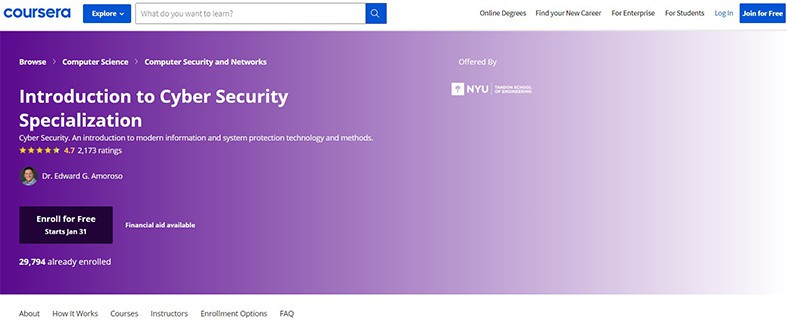
Users with little experience in IT management and general computing concepts should be able to easily follow this course. Officially, the course is marked for beginner level students hence no prior technical knowledge or experience is expected other than the usual basics.
Most of the information available via the Cyber Security Course from NYU deals with developing a deeper understanding of system protection technologies (and methods) and modern information systems. The course takes help from teaching aids such as projects and quizzes to help students learn the material. The material presented in the course is mostly foundational and hence can prove beneficial for students trying to apply the cybersecurity principles in assessing, improving, and securing real-world hardware, software, and networking systems. This course also takes help from authentic examples from practical infrastructure deployments and hands-on cybersecurity problems.
Students can expect the duration of the course to last around 4 months assuming close to 4 hours a week are spent studying the material.

The Introduction to Cyber Security Specialization course from NYU consists of four courses. The first course is Introduction to Cyber Attacks in which students learn about the basics of different cyber threats, security vulnerabilities, and risk analysis. Then students have to take the second course labeled Cyber Attack Countermeasures. As the name of the course suggests, students learn the fundamental concepts of cyber defense including information flow frameworks and Bell-LaPadula. Students also learn the basics of cryptography in this course. The third-course students have to take is called Real-Time Threat Detection and Mitigation. While taking the course, students learn about real-time cyber security methods and techniques. The course also covers TCP/IP security hacks and strengths/weaknesses of intrusion prevention systems and firewalls.
Finally, the fourth course is Enterprise and Infrastructure Security. This course talks about the latest trends and techniques in cyber security relevant to infrastructure and enterprise settings. Students get introduced to PCI and NIST. Additionally, hybrid cloud architectures and advanced emerging security problems (such as IoT, blinding algorithms, blockchain, and mobile security) are also discussed.
Coursera is the platform via which interested students can access the Introduction to Cyber Security Specialization course.

Going through the course will allow students to learn skills such as risk assessment, cryptography, cyber defense, INFOSEC, DOS, and modern cyber attacks. Completing the course will qualify the student for a certificate that can help advance the student’s career in cybersecurity.
The Introduction to Cyber Security Specialization is one of the most highly-rated online cybersecurity courses because, one, the course is offered by New York University (making it very credible), two, it covers the most in-demand and latest topics in cybersecurity (including blockchain and new algorithms), three, it organizes content to make learning easier and, four, it costs only $29 per month or $59 per month based on the student’s subscription package. Students can enroll for free.
What are the Benefits of Online Courses to Learn Cybersecurity Basics?
The benefits of online courses to learn cybersecurity basics are given below:

- Gaining Cybersecurity skills
- Almost all courses are completely online so there is no requirement to travel
- Flexible scheduling
- Students can study part-time and also work part-time more easily
- Courses are updated more regularly than traditional computer science degrees
- Online help is available usually on the same platform offering the course
- Discounts are available
- Easy format (usually lectures are recorded in video format and instructors interact with students via online forums)
- There are some free courses
Can You Learn Advanced Skills of Cybersecurity from Online Courses?

Yes, with the right educational background anyone can learn advanced skills of cybersecurity from online courses. Anyone can Google cyber security courses and see hundreds and thousands of MOOCs(Massive Open Online Courses) are available for free and/or at a very economical rate.
Platforms offering online cybersecurity courses such as Coursera, Udemy, and Pluralsight usually have three levels of cybersecurity courses starting from a Beginner level and then offering Intermediate and Expert level courses as well.
Almost all courses mention the background education requirements which can include prior industry experience and/or degrees in relevant fields. Courses from well-known Instructors such as Andrew Ng (who offers multiple machine learning courses on Coursera) are, in many cases, enough for people to start entry-level jobs in the field. People already working in a related field can switch fields (for example, to machine learning) just by going through the courses available on platforms like Coursera.
Pro Tip:
Students can easily develop a high level of expertise by progressing through the experience levels of online courses whilst ultimately specializing in a specific field. By interacting with other students specializing in the same area, students can get in touch to share career tips and more learning opportunities, even when the course is over.Many cybersecurity sources available online have started to offer student assistance programs where instructors (or consultants hired by the institution offering the course) help students who have taken the course apply for jobs and advanced careers.
Can You Become a Cybersecurity Expert with Online Courses?

Yes, students interested in cybersecurity can become cybersecurity experts with online courses, provided the relevant experience is gained via part-time jobs. Online platforms offer cybersecurity courses for all skillsets. However, the responsibility of putting the material learned into practice lies primarily with the student. Many online forums offer job opportunities for beginner programmers in the field of cybersecurity (Toptal and Turing are just two examples of such platforms).
Students can take advantage of such opportunities to build up a resume and then move on to applying for real-world jobs via advertisements and job search sites like Monster, Indeed, and SimplyHired.
The requirements for becoming a cybersecurity expert will vary depending on the type of job the student desires to apply for. Different courses will be more or less useful depending on the requirements of the employer. It is also important to remember that some cybersecurity courses available online claiming to make students cybersecurity experts may not do so. Hence, students should carefully read online reviews of any cybersecurity course available via various platforms.
Generally, though, anyone trying to become a cybersecurity expert will have to go through some training. Since cybersecurity jobs are highly specialized, students will likely have to go through multiple courses to get a grip on the fundamentals of cybersecurity.

Cybersecurity education can come in the form of an associate’s degree, a simple bachelor’s degree, and/or a master’s level education. Most of such degrees will borrow heavily from other related degrees such as mathematics, engineering, and computer science. In addition to a good foundational education, students willing to become cybersecurity experts will also need work experience.
After ensuring proper education and related work experience, students will also need various clearances and certifications in the field of cybersecurity. Unlike many other fields, a cybersecurity professional generally has to earn certifications throughout a given career.
As for which certifications to take, that inevitably depends on the company or the sub-field the cybersecurity professional in question is trying to apply for. Generally, any cybersecurity professional looking to become an expert and advance their career options should obtain the Certified Ethical Hacker (CEH) accreditation, offered by EC-Council. CEH is one of the more advanced cybersecurity certifications. Cybersecurity professionals who do not have several years of work experience should try for some of the other certifications mentioned below. The CEH certification acts as proof that the cybersecurity professional understands different kinds of cyber attacks and how hackers set those attacks up. Cybersecurity professionals with the CEH certification have advanced mitigation skills and threat assessment techniques.

Another text/exam certificate that cybersecurity professionals should try and clear is the Certified Information Systems Security Professional (CISSP). The CISSP certification is again, only for cybersecurity professionals looking to become experts in the field. Those trying to pass the test will have to show competence in topics such as engineering, management, and architecture.
Cybersecurity professionals looking to advance further should also take the Network+ test offered by CompTIA. The Network+ certification tests students on topics such as network operations and infrastructure. Unlike the two certifications mentioned above, the Network+ certification is generally considered a beginner to intermediate certification. Another important certification is the Security+ test, offered by CompTIA. The Security+ test is a beginner-level certification that checks a given cybersecurity professional’s knowledge on threat assessment and risk management.
After obtaining the relevant certifications, cybersecurity professionals then need to get the right experience and network well to finally become an expert and enhance their earning potential.
Do Cybersecurity Experts Give the Online Courses?

Yes, cybersecurity experts do give online courses via various platforms. Some of the courses offered by cybersecurity experts were mentioned in the earlier part of this guide.
Readers should differentiate cybersecurity experts offering online courses to train people in cybersecurity from cybersecurity influencers. While cybersecurity influencers like Runa Sandvik, Eugene Kaspersky, Jeremiah Grossman, Raj Samani, Kevin Mitnick, and Brian Krebs offer great information on the state of cybersecurity and cybercrime, such influencers don’t offer complete cybersecurity courses.
Cybersecurity experts that offer good online cybersecurity courses include Howard Poston and Howard’s course Python for Cybersecurity Specialization offered by INFOSEC. Howard works as a freelance cybersecurity researcher and consultant. This cybersecurity expert specializes in areas such as blockchain, cryptography, malware analysis, and cyber threats. The course teaches students how to use Python for cybersecurity. Students interested in the course can head over to Coursera and enroll for free.

Another cybersecurity expert is Herbert J Mattord, who offers the Managing Cybersecurity on Coursera, offered by the University System of Georgia. Herbert holds a Ph.D. degree in Information Systems and teaches Cybersecurity courses at Kennesaw State University. Herbert is also the Director of Education and outreach at KSU Institute for Cybersecurity Workforce Development.
Finally, another good course is the Palo Alto Network Cybersecurity Professional Certificate on Coursera (again, as Coursera is the most trustworthy and reliable online education platform of the lot) offered by James Dalton. James works as an Academy Curriculum Developer at Palo Alto Networks and offers several courses on cybersecurity. The Palo Alto Networks Cybersecurity Professional Certificate grants students the skills required to enter the cybersecurity workforce in compliance with NICE and NIST.
Do You Need a College Education to Become a Cybersecurity Expert?

No, interested students do not need a college education to become cybersecurity experts. However, some college education can ease the process of getting a job and promotion as a cybersecurity expert.
Different people become cybersecurity experts via different routes depending on the specific cybersecurity role of the person in question. Generally speaking though, anyone looking to become a cybersecurity expert needs to get an education with a heavy emphasis on cybersecurity and cryptography fundamentals, network scripting, architecture, and administration in addition to defensive security, offensive security, and threat analysis (and prevention). That education can either come via online cybersecurity courses or traditional university degrees.
As mentioned before, certifications are almost always required for someone to become a cybersecurity expert. Some of the best cybersecurity school degree programs for Undergraduate cybersecurity studies include Carnegie Mellon University and Georgia Institute of Technology, secondary to these are Massachusetts Institute of Technology and the University of California, Berkeley. Some lesser-known schools for cybersecurity (even beyond undergraduate studies) include Bentley University, Bowie State University, Howard University, and Virginia Tech. There are many alternatives not on this list.

The main advantage of online cybersecurity courses relative to college degrees is that they are much cheaper. Even the most expensive cybersecurity course does not cost over $5000, making them an affordable option for many people, unlike college degrees which can cost hundreds of thousands of dollars in the case of some elite universities and colleges.
This is important:
Cybersecurity courses online mainly focus on the skills that are required to do a job and hence are very focused on the way material is taught to the student. College degrees offer a much wider array of subjects and are not as concentrated on a given subject as online cybersecurity courses are. The duration of college degrees runs in years while online cybersecurity courses rarely last over 6 months.Another difference is the way the material is taught. A college education offers more opportunities to learn and interact with the material while online courses limit the number of ways the student can interact with the content being taught and the environment.
Is It Better to Start Cybersecurity with an Online Course?

For some people looking to become cybersecurity professionals and experts, starting to learn about cybersecurity with an online course may be better. For others, going through a college degree may offer better returns.
Online courses have many advantages over traditional cybersecurity degrees and other methods of learning more about cybersecurity (to eventually work in the field). The primary reason why students interested in cybersecurity should start with an online course is convenience, economy, and relevance. Online cybersecurity courses are effective because students can learn whenever and wherever an internet device is available. Moreover, online cybersecurity courses have flexible schedules and allow students to take as much time as necessary to understand the presented material.

Online cybersecurity courses are also effective because of the price students have to pay for access. Even the best cybersecurity courses (which are essentially full specializations consisting of multiple courses from reputable universities) do not cost more than $2800. On sites like Coursera, users can earn as many cybersecurity certificates as possible by paying a small subscription fee (around $59 per month). This allows students to experiment and test the waters before fully committing to a career in cybersecurity.
Cybersecurity courses offered by online programs are also effective because of the up-to-date and cutting-edge content. Platform and course developers can quickly change/update and improve cybersecurity courses according to the needs of the industry at any given time. This makes cybersecurity courses online the best way to learn about the latest trends in the cybersecurity industry and learn valuable in-demand skills at the right time.
Are There any Free CyberSecurity Courses?

Yes, there are many free cybersecurity courses available online. The best places to find free cybersecurity courses is Coursera (where prospective students can audit a course and/or enroll in the course for free but without qualifying for a certificate), EdX (which is another very reputable and trustworthy platform for advanced studies in many cybersecurity sub-fields) as well as many other online locations.
Coursera and edX are considered the best in terms of the overall course syllabus. However, SimpliLearn also offers good quality, free cybersecurity courses.
While anyone can benefit from taking a cybersecurity course or two, there are some drawbacks to free cybersecurity courses. The primary one is that almost no online platform offers a certificate of completion without a subscription fee (even though students can study the material given in the course). Breaking into the cybersecurity industry can be hard without a college degree or certification of course completion. With no proof of cybersecurity training, students may struggle to find work.
Note:
Free cybersecurity courses often tend to be less up-to-date than paid ones. This can be a problem for someone trying to break into the cybersecurity field where up-to-date knowledge is of utmost importance.Apart from that, free cybersecurity courses seldom offer any guidance on how to go about completing the course or any other type of help such as student forums, online discussions, some face time with the instructor of the course. That can make studying and applying the material presented in the course that much harder.
Students coming from a non-technical background may also find studying for a free cybersecurity course harder as these don’t offer complete background material to get the student in shape for advanced concepts.

